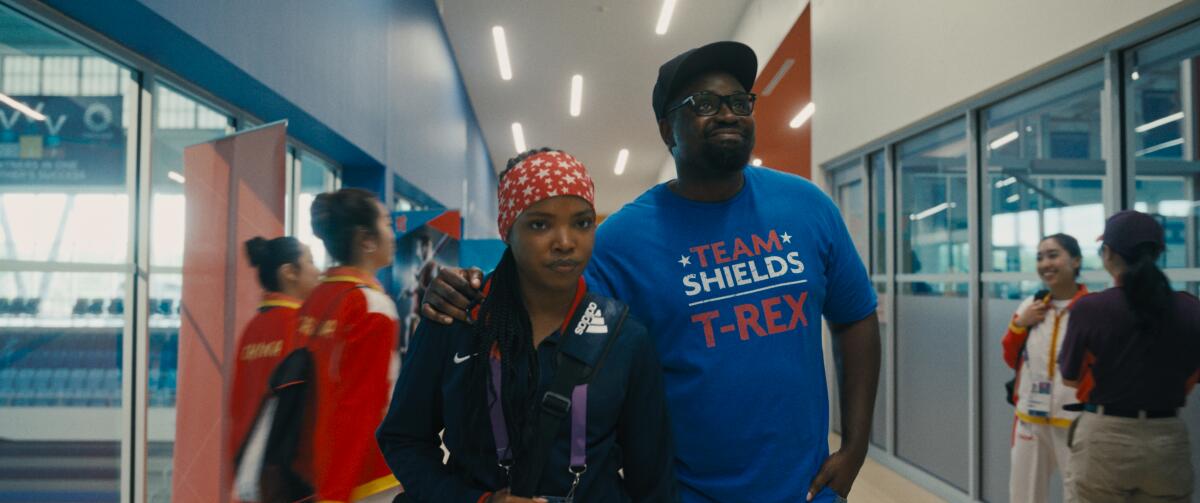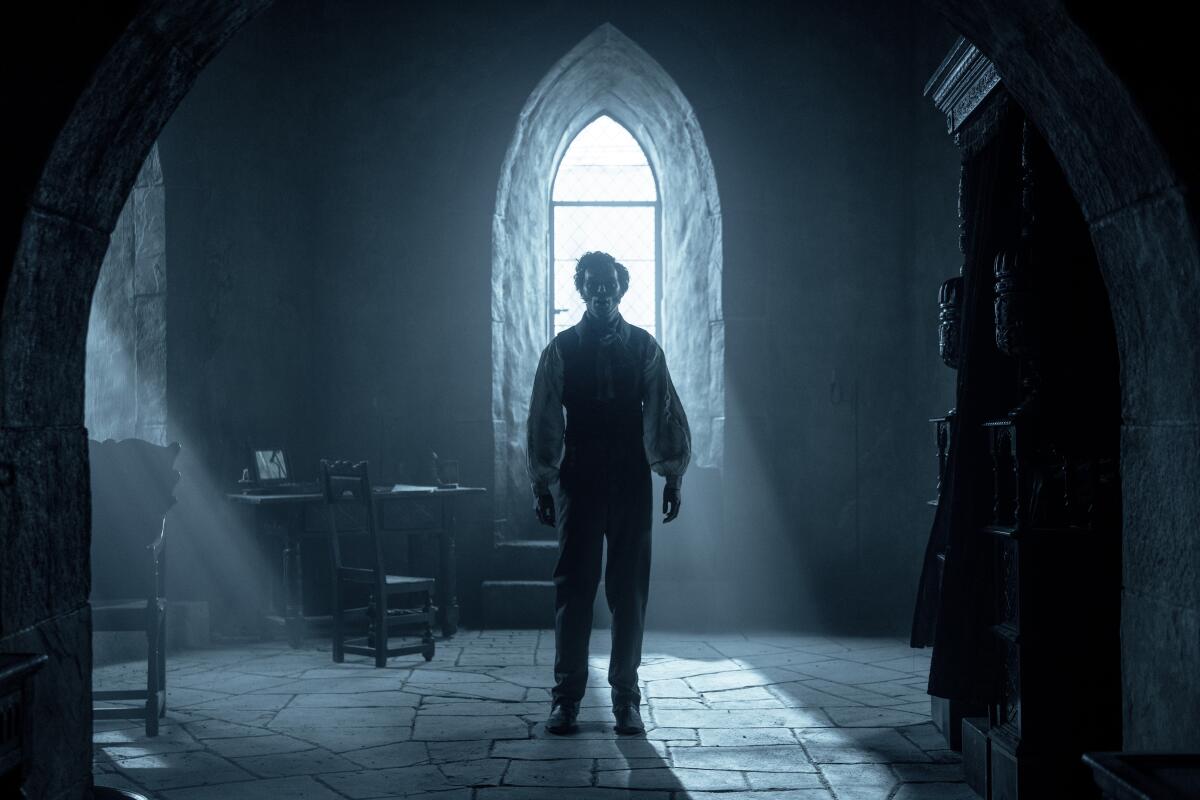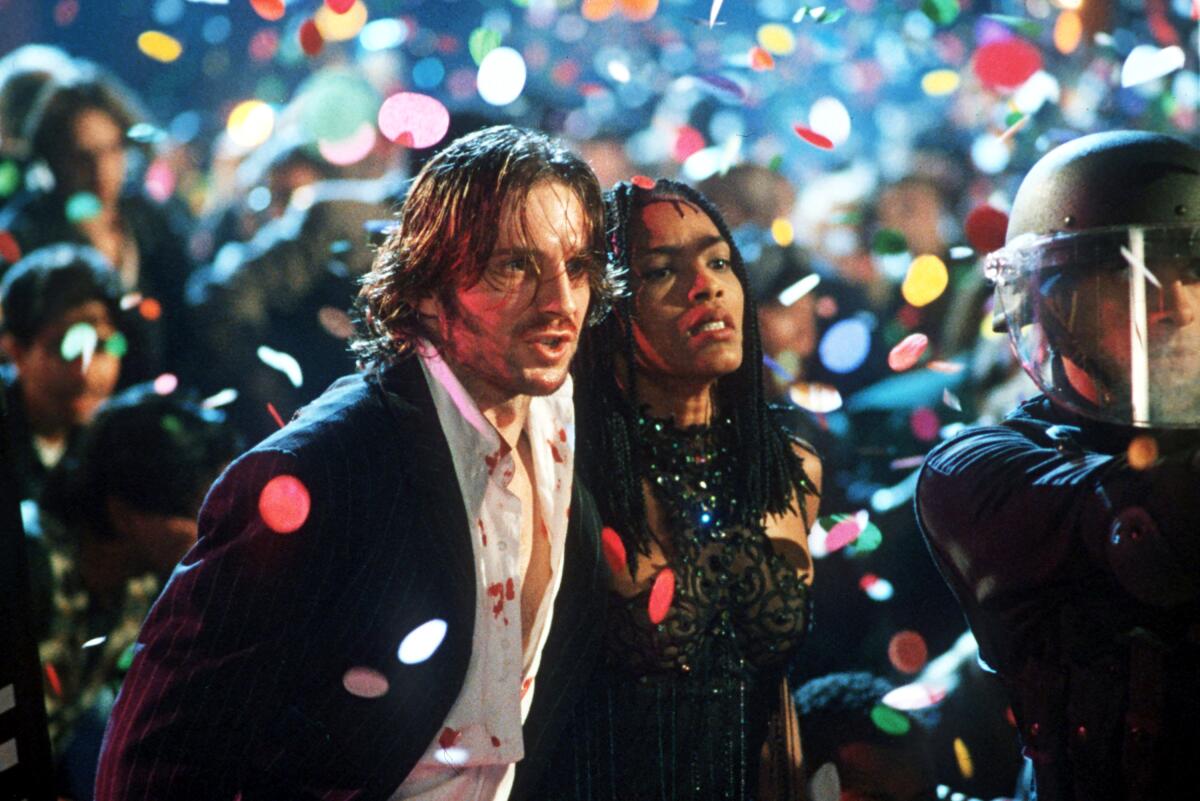Hello! I’m Mark Olsen. Welcome to another edition of your regular field guide to a world of Only Good Movies.
I recently had the pleasure of moderating this year’s Envelope Directors Roundtable with the knockout lineup of Edward Berger (“Conclave”), Brady Corbet (“The Brutalist”), Coralie Fargeat (“The Substance”), James Mangold (“A Complete Unknown”), Denis Villeneuve (“Dune: Part Two”) and Malcolm Washington (“The Piano Lesson”). The full video will broadcast on Spectrum and be available on YouTube later today.
From our edited print transcript, the group began talking about what they can compromise on and what they cannot. Villeneuve and Fargeat said that, within the confines of their budget and logistics, they have an attitude of no compromise, as often as possible.
As Fargeat said, “Everybody sometimes wants to try and change it and make a difference. It’s my job to keep it the way I had invented in my head.”

Directors Edward Berger, left, James Mangold, Coralie Fargeat, Malcolm Washington, Denis Villeneuve and Brady Corbet, photographed at the Los Angeles Times offices in November.
(Christina House / Los Angeles Times)
Conversely, Berger noted that the vaping cardinal in “Conclave,” which has now become a meme and a fan favorite, wasn’t in the script, but was a response to the actor on set in his costume vaping between takes.
Mangold, director of “A Complete Unknown,” said, “We all make plans before we start. But then the secret, at least in my experience — the work I’m most proud of is where I adapt. It’s not about compromise, but it’s that the world, the actor, in that moment, the weather, the location, the schedule, something within the very real confines that Denis was talking about comes up against your vision. … The reality is how we adapt to the s— that happens, good and bad, which isn’t about compromise, but it’s about being alive.”
A holiday harvest of new releases
This holiday season has brought us a terrific bounty of films to round out our end-of-year moviegoing, with “Babygirl,” “The Fire Inside,” “A Complete Unknown” and “Nosferatu” all landing in theaters this week. (And that’s not even mentioning the see-it-to-believe-it “Better Man,” a biopic about British pop star Robbie Williams, portrayed by a CGI chimp.)
Seeing all four of these movies in one day might be a stretch, but it would be doable to see at least three, or maybe break them up into two days of double features. I think I personally would suggest the order they land below for the best mix of genres and moods. If anyone thinks there is a better approach to this lineup, let me know.
‘Babygirl’

Nicole Kidman and Harris Dickinson in the movie “Babygirl.”
(Niko Tavernise / A24)
Written and directed by Halina Reijn, “Babygirl” stars Nicole Kidman as a Manhattan CEO who finds herself drawn into a submissive relationship with Samuel (Harris Dickinson), a strangely dominating new intern at her company. The film becomes an exploration of power dynamics and personal identity cloaked as an erotic thriller with a dash of corporate intrigue.
In Amy Nicholson’s review, she noted, “Eight years into the #MeToo movement, our reaction to the plot could fall anywhere on a spectrum between ‘Yaaaas queen’ to ‘How hypocritical!’ … Both know their affair is happening in a cultural minefield where the trip wires are economic, professional and generational. And nowadays, the intern recognizes his boss has the most to lose.”
Amy added, “The smartest choice the film makes is that Samuel isn’t some “Fifty Shades of Grey” BDSM mastermind. He learns to control as she learns to submit. Their shared adventure plays out like two people learning to juggle while staring into each other’s eyes. Sometimes, it’s clumsy. Their first tryst starts off like a bad porno with Samuel and Romy improvising a script that feels phony even to them. They have to break the scene and start again, with Samuel trying to making Romy eat candy from his hand. She pauses. He’s frustrated. ‘Can you just try it?’ he asks. The whole movie hinges on that awkward moment. Right there, Reijn decides that the strongest foundation for all of our species’ sex angst is simply consent. Forget right or wrong. ‘Babygirl’s’ key question is yes or no.”
Emily Zemler spoke to Dickinson, who explained how the sense of discovery in the movie is something he felt while making it as well.
“I was fascinated by the writing and the character because I didn’t really know what I would do with it,” Dickinson said. “It scared me a little bit, in the sense of ‘I don’t know how exactly best to do this in a way that’s going to elevate the rest of the story.’ But I guess that’s why it eventually led me to do it.”
Certified sex educator Laura Ramadei wrote about the film’s depiction of kink, noting, “‘Babygirl’ appears to understand a common reality behind the kink: Many accomplished, strong women (and men) want to turn their brains off and fully submit to the right Dom. It also highlights a common limitation — that for skillful domination, emotional intelligence is equally, if not more, important than physical talent. The film also understands the power of unlocking such a dynamic, without being gratuitous about the visual details.”
‘The Fire Inside’

Ryan Destiny, left, and Brian Tyree Henry in director Rachel Morrison’s “The Fire Inside.”
(Amazon MGM Studios)
Directed by Rachel Morrison from a screenplay by Barry Jenkins, “The Fire Inside” is based on the true story of Claressa Shields, who won back-to-back Olympic gold medals in women’s boxing. But the story isn’t a typical tale of sports triumph, instead paying attention to what happens — and doesn’t happen — to Shields (Ryan Destiny) and her coach (Brian Tyree Henry) after she wins her first gold.
As Robert Abele put it in his review, “‘The Fire Inside’ is no pity party about a system’s inequality, and the movie’s refusal to paint anyone in Claressa’s life as simply an impediment or an ally is another sign of the movie’s welcome (and very Jenkins-esque) emotional intelligence. And while the boxing is kinetically directed, Morrison grasps that the movie’s fiercest stands are taken outside the ring, when Claressa — faced with tough choices about her future — asserts herself to the people who need to hear it. That spin on an ever-roiling motivation to win, even when the bout is over, is what sets ‘The Fire Inside’ apart from so many others of its ilk.”
For The Envelope podcast, I spoke to Destiny about the role and what it means to bring Shields’ story to a broader audience.
“The first time that I watched the movie, I was looking for different things that I kind of wanted to do better,” Destiny recalls. “I was just nitpicking myself. The second time it really hit me how incredible her story is and how much this means to people and to her and how much it’s needed. Her story is so inspiring and incredible, and I literally cried because it really touched me in a way that made me see it from a different standpoint and see the bigger picture of what it’s really about.”
‘A Complete Unknown’

Timothée Chalamet as Bob Dylan in the movie “A Complete Unknown.”
(Searchlight Pictures)
Directed by James Mangold from a screenplay by Mangold and Jay Cocks (adapting Elijah Wald’s book, “Dylan Goes Electric!”) “A Complete Unknown” tells the story of a young Bob Dylan (Timothée Chalamet) as he arrives in New York City in 1961, continuing through to his legendary performance at the Newport Folk Festival in 1965. But it also very much tells the story of the people around Dylan, including his girlfriend Sylvie (Elle Fanning), singer and paramour Joan Baez (Monica Barbaro) and folk singer Pete Seeger (Edward Norton).
Reviewing the film, Joshua Rothkopf wrote, “Superfans aren’t necessarily going to love this. It’s a movie made with affection, but also with the wisdom that visionaries can sometimes be jerks. Then again, their hero won’t get a fairer shake than in ‘A Complete Unknown,’ which presents the tunes vividly (classic after classic, all of them sung live by the cast) while keeping things neatly chronological among the four or so years that any biopic interested in Dylan’s artistic arrival would have to cover, from his penniless 1961 arrival in New York through his 1965 rebellion at the Newport Folk Festival. … [Mangold and Cocks] have landed on a counterintuitive but brilliant organizing principle, one that no great-man biopic has, to my mind, ever tried. In order for this dream to happen, that is, in order for Dylan to become Dylan, a lot of other people’s dreams had to die.”
Esther Zuckerman spoke to Fanning, whose character of Sylvie Russo is based on Suze Rotolo, the character’s name reportedly changed at the behest of Dylan himself. The singer’s involvement had an impact on Fanning’s performance, she said.
“I was always aware that Bob Dylan himself wanted her name changed and that was the one character that he was very precious about,” Fanning said. “Knowing that, I just felt kind of this subconscious weight to want to do justice to what they had.”
‘Nosferatu’

Nicholas Hoult in director Robert Eggers’ “Nosferatu.”
(Aidan Monaghan / Focus Features)
Written and directed by Robert Eggers, “Nosferatu” is the filmmaker’s adaptation of the 1922 silent horror classic originally mounted by director F.W. Murnau and since remade by Werner Herzog and, to an extent, E. Elias Merhige with 2000’s “Shadow of the Vampire.” In this telling, young Thomas Hutter (Nicholas Hoult) is dispatched to a remote castle to finalize the paperwork on a property purchase by the mysterious Count Orlok (Bill Skarsgård). Hutter is unaware of the supernatural bond the Count has with his wife, Ellen (Lily-Rose Depp), who has been suffering from an unknown condition.
For The Times, Katie Walsh wrote, “Eggers’ version isn’t a ‘take’ on ‘Nosferatu’ so much as it is an overly faithful retelling, so indebted to its inspiration that it’s utterly hamstrung by its own reverence. If ‘Shadow of the Vampire’ was a playful spin, Eggers’ ‘Nosferatu’ is an utterly straight-faced and interminably dull retread of the 1922 original. It’s the exact same movie, just with more explicit violence and sex. And while Eggers loves to pay tribute to styles and forms of cinema history in his work, the sexual politics of his remake feel at least 100 years old. … The film is a feat of maximalist and moody production design and cinematography, but the tedious and overwrought script renders every character two-dimensional, despite the effortful acting and teary pronunciations.”
Kenneth Turan spoke to Eggers, who talked about the intensely detailed research and production work that he has become notorious for in films such as “The Witch” and “The Northman.” As Eggers said, “I personally enjoy the act of research and while I get tired of beating the drum for historical accuracy, I do believe an accumulation of details grounds and transports an audience, makes it easier for them to believe the metaphysical stuff in the film.”
Points of interest
Kathryn Bigelow’s ‘Strange Days’

Ralph Fiennes and Angela Bassett in the movie “Strange Days.”
(Merie W. Wallace / Universal Pictures)
To launch its new series “Cyberpunk: Envisioning Possible Futures Through Cinema” and exhibition of the same name, the Academy Museum will be screening Kathryn Bigelow’s 1995 “Strange Days” on 35mm. Seeing this movie, arguably Bigelow’s best, big and loud in the academy’s huge David Geffen theater should be a dazzling experience.
With a climax set around a massive New Year’s Eve party in downtown Los Angeles, the film is set on the cusp of the year 2000, then five years away. (The film’s screenplay was written by James Cameron and “A Complete Unknown’s” co-writer Jay Cocks.) Ralph Feinnes plays Lenny Nero, a former LAPD officer who traffics in underground videos that presage virtual reality. When a tape of the murder of a popular rapper threatens to implicate the LAPD and lands Lenny in danger, he turns to an old friend, Mace (Angela Bassett), for help. Playing Lenny’s former girlfriend, Juliette Lewis performs a couple of PJ Harvey songs onscreen in the film and is almost worth the price of admission alone.
Reviewing the film at the time of its release, Kenneth Turan wrote, “Through it all, ‘Strange Days’ manages to be consistently loud, violent and sleazy, which is less of an accomplishment than it may sound.”
